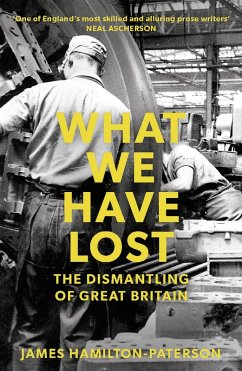'Exquisitely written and ripe with detail' Sunday Times.
'An engaging book... He knows his British stuff' The Times.
'One of England's most skilled and alluring prose writers in or out of fiction, has done something even more original' London Review of Books.
WHAT WE HAVE LOST IS A MISSILE AIMED AT THE
BRITISH ESTABLISHMENT, A BLISTERING INDICTMENT
OF POLITICIANS AND CIVIL SERVANTS, PLANNING
AUTHORITIES AND FINANCIAL INSTITUTIONS, WHO HAVE
PRESIDED, SINCE 1945, OVER THE DECLINE OF BRITAIN'S
INDUSTRIES AND REPLACED THE 'GREAT' IN BRITAIN WITH
A FOR SALE SIGN HUNG AROUND THE NECK OF THE NATION.
Between 1939 and 1945, Britain produced around 125,000 aircraft, and enormous numbers of ships, motor vehicles, armaments and textiles. We developed radar, antibiotics, the jet engine and the computer. Less than seventy years later, the major industries that had made Britain a global industrial power, and employed millions of people, were dead. Had they really been doomed, and if so, by what? Can our politicians have been so inept? Was it down to the superior competition of wily foreigners? Or were our rulers culturally too hostile to science and industry?
James Hamilton-Paterson, in this evocation of the industrial world we have lost, analyzes the factors that turned us so quickly from a nation of active producers to one of passive consumers and financial middlemen.
'An engaging book... He knows his British stuff' The Times.
'One of England's most skilled and alluring prose writers in or out of fiction, has done something even more original' London Review of Books.
WHAT WE HAVE LOST IS A MISSILE AIMED AT THE
BRITISH ESTABLISHMENT, A BLISTERING INDICTMENT
OF POLITICIANS AND CIVIL SERVANTS, PLANNING
AUTHORITIES AND FINANCIAL INSTITUTIONS, WHO HAVE
PRESIDED, SINCE 1945, OVER THE DECLINE OF BRITAIN'S
INDUSTRIES AND REPLACED THE 'GREAT' IN BRITAIN WITH
A FOR SALE SIGN HUNG AROUND THE NECK OF THE NATION.
Between 1939 and 1945, Britain produced around 125,000 aircraft, and enormous numbers of ships, motor vehicles, armaments and textiles. We developed radar, antibiotics, the jet engine and the computer. Less than seventy years later, the major industries that had made Britain a global industrial power, and employed millions of people, were dead. Had they really been doomed, and if so, by what? Can our politicians have been so inept? Was it down to the superior competition of wily foreigners? Or were our rulers culturally too hostile to science and industry?
James Hamilton-Paterson, in this evocation of the industrial world we have lost, analyzes the factors that turned us so quickly from a nation of active producers to one of passive consumers and financial middlemen.









